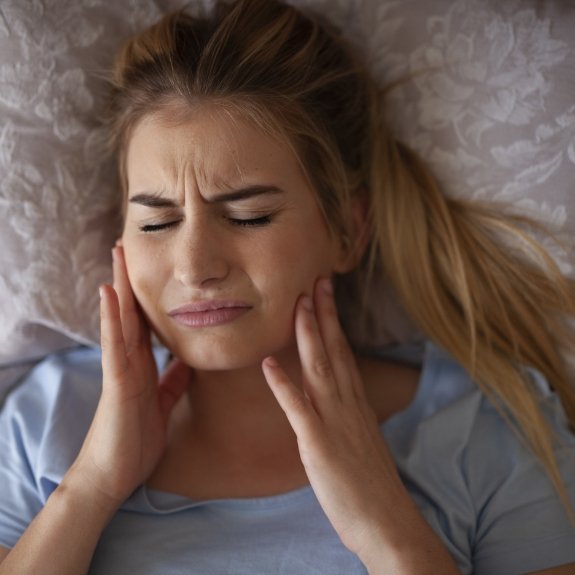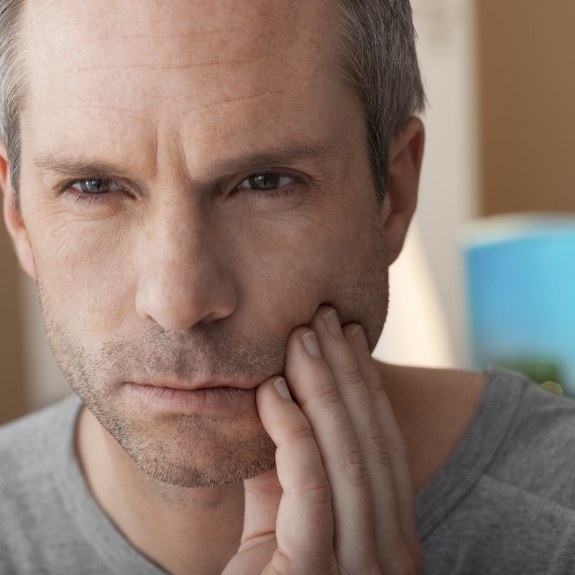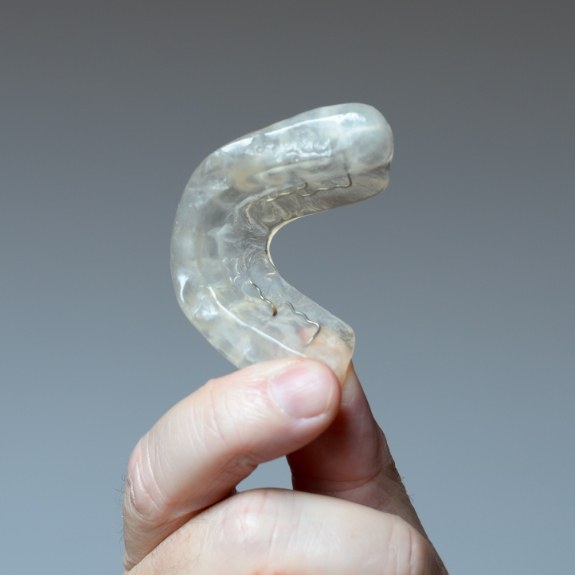Nightguards for Teeth Grinding – Dublin, OH
The Best Way to Rest Easy
Are you a nighttime teeth grinder? If you experience interrupted sleep, increased tooth sensitivity or if anyone has ever noticed you gnashing your teeth during sleep, you probably do have the condition we also call bruxism. Learn more about nighttime teeth grinding, including its causes, symptoms and treatment with nightguards for teeth gringing from the Dublin, OH dental team at Distinctive Smiles of Dublin today.
Why Choose Distinctive Smiles of Dublin for Nightguards for Teeth Grinding?
- 100% Custom-Made Guards for Each Patient
- Able to Stop Jaw Pain & Headaches
- Designed to Last
All About Bruxism

Because clenching of the jaw and grinding teeth are both common symptoms of stress, many adults experience occasional bouts of nighttime teeth grinding. But if your symptoms go beyond the temporary, you likely suffer from the chronic condition. Bruxism often occurs as a result of a misaligned bite or missing or crooked teeth.
Symptoms of bruxism include the following:
- Teeth grinding or clenching that is loud enough to wake a partner
- Teeth that show signs of wear (breaks, cracks, flatness)
- Worn tooth enamel resulting in increased sensitivity
- Jaw and/or facial pain
- Dull, chronic headaches, especially upon waking in the morning
Don’t wait to seek treatment for bruxism if you or a loved one are suffering from these symptoms. Left untreated, bruxism can cause dental damage including tooth fractures and breaks. Problems with the jaw muscles (known as the TMJ) can also develop as a result of prolonged teeth grinding, so it's important to receive preventive dentistry treatment to keep your smile healthy. Seeking a diagnosis and effective solution for bruxism is the key to enjoying a restful night’s sleep once again.
Treating Bruxism

For teeth grinding that is caused by stress, certain lifestyle changes can help to reduce the occurrence of bruxism and relieve symptoms. Some things to consider for reducing stress and anxiety include meditation, exercise, dietary changes and talking to a therapist.
Some other ways to reduce teeth grinding by rethinking certain lifestyle habits include:
- Cutting back on caffeine (especially in the afternoon and evening)
- Reducing alcohol, as the occurrence of teeth grinding raises with alcohol consumption
- Break nail biting and pen chewing habits
- Remember to relax your jaw throughout the day, and help to relax it even more at night before sleep by applying a warm compress on your jaw muscles.
- Find out if your bruxism is caused by an underlying sleep condition, like sleep apnea.
Custom Nightguards for Bruxism

For bruxism that occurs as a result of a pre-existing sleep disorder or due to a misaligned bite or missing teeth, a professional solution is necessary. Talk to your dentist about treatment for bruxism.
Getting fit with a custom mouthguard you wear while you sleep can help to stabilize the jaw and protect the teeth from excessive force. Dr. Eric Buck provides custom oral appliances to help patients suffering from teeth grinding protect their smiles and enjoy a full, uninterrupted night’s sleep. That’s much-needed relief for the sufferer -- and for their partner, too.
I Need a Checkup & Cleaning I Need a Dentist for My Child I am Concerned About Bleeding Gums I Have a Cavity or Broken Tooth I am Missing One or More Teeth I Want to Enhance My Smile I Want a Straighter Smile I am Scared of the Dentist I am in Pain & Need Help I am Concerned About Sleep Apnea I Have Pain in My Jaw View Our Services
